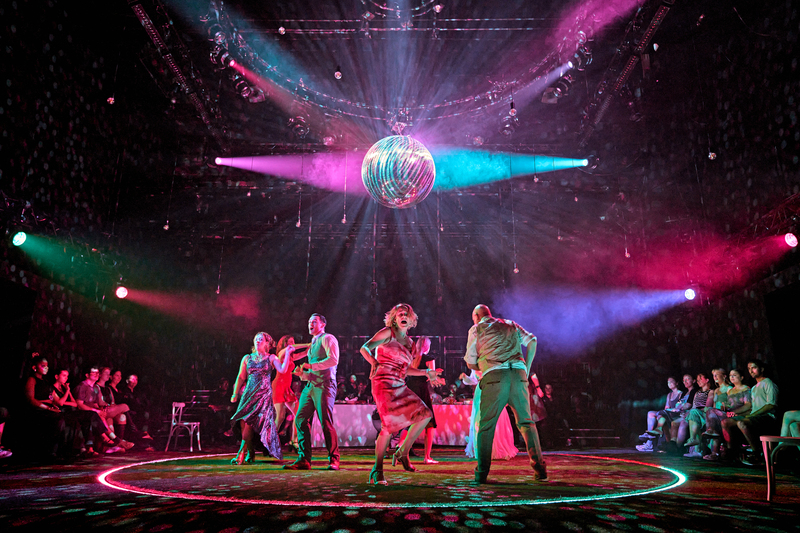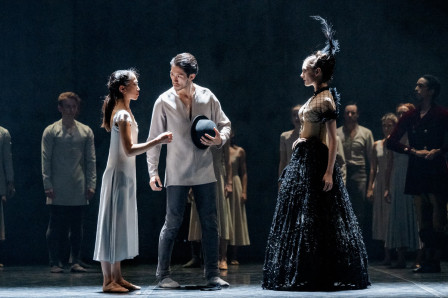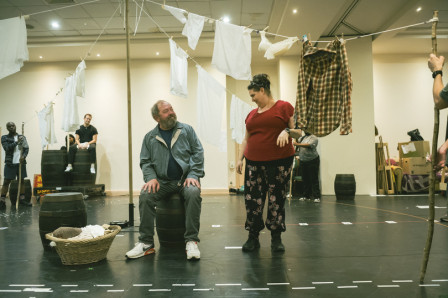Review: TILL THE STARS COME DOWN at Theatre Royal Haymarket
Beth Steel's caustic family drama has a whole host of unexpected skeletons in its closet, and the excellent cast which includes many from last year’s National Theatre run, remain hell-bent on airing them.
 The cast of 'Til the Stars Come Down. Photo by Manuel Harlan.
The cast of 'Til the Stars Come Down. Photo by Manuel Harlan.
At an East Midlands former coal mining town where the largest employer is now a warehouse, three sisters prepare for the wedding of one of their number to a successful Polish immigrant. The scene is primed to unveil a gamut of familiar tropes — class disenchantment, resentment of foreigners, decades-old family feuds and of course the unforgivable cruelty of exposing youngsters to the horrific sight of sweaty aunts and uncles cutting drunken moves on a wedding dance floor!
Sylvia and Marek's wedding day starts with a cacophony of women, bustling and faffing, preening and preparing, exchanging familial familiarities and furtively side-stepping those potentially ugly, closeted skeletons. Each member of the tightly knit cast contributes to the layers, whilst never losing sight of their very individual experience of what it means to be part of this family. In the presence of barely suppressed anger, grief, regret and yearning for the unattainable, it falls to alcohol to act as the catalyst for revelations from which there can be no return to a state of polite pretension.
Underpinning the simmering spectacle in director Bijan Sheibani's production (which despite transferring to a proscenium arch theatre, retains much of its original in-the-round staging), is an unavoidable truth — namely, that one person's success, is another's reason to feel resentment. Here, that flows effortlessly into expressions of bigotry and betrayal. In fact so much is thrown into the melting pot, that by the end, the result should be an unwholesome mess, but precisely the opposite is true. The strength of individual characterisations elevates the drama from a mere cacophony of raw emotions, and is further supplemented by an unending stream of hilariously dumped one-liners. In particular, Dorothy Atkinson as Aunty Carol (from the moment she unexpectedly pitches-up in curlers during the opening scene), gives off an air of dangerous unpredictability, rendering her crass and gem-like observations all the more shocking and funny. Elsewhere, there is a tangible sense of loss and heartbreak in Aisling Loftus' stoic performance as Maggie, resisting the urge to pursue her own hopes of happiness, knowing the potential impact it will have on her sisters. Hazel (Lucy Black), whose powerlessness has left her bereft of solutions and vulnerable to feelings of bitterness and resentment, seeks reassurance from husband John (Adrian Bower) who has evidently fallen out of love with her. When events take a dark and menacing turn, it is considerate and astute Marek (Julian Kotsov) who bears the brunt of pent up resentment, leaving his new wife Sylvia (Sinéad Matthews) to act as the audience's conscience in calling-out injustice.
You may argue that all families have their problems, but rarely are they this messy, or downright entertaining.
With a running time of 2 hours 20 mins (including 20 min interval), TILL THE STARS COME DOWN continues at Theatre Royal Haymarket until 27th September.
Latest News

 Cast announced for major London revival of The Holy Rosenbergs
19 January 2026 at 09:00
Cast announced for major London revival of The Holy Rosenbergs
19 January 2026 at 09:00

 Akram Khan's Giselle at London Coliseum review
18 January 2026 at 20:39
Akram Khan's Giselle at London Coliseum review
18 January 2026 at 20:39

 The Unlikely Pilgrimage of Harold Fry at Theatre Royal Haymarket - Rehearsal images released
16 January 2026 at 15:41
The Unlikely Pilgrimage of Harold Fry at Theatre Royal Haymarket - Rehearsal images released
16 January 2026 at 15:41

 ALREADY PERFECT at King's Head Theatre Review
16 January 2026 at 10:25
ALREADY PERFECT at King's Head Theatre Review
16 January 2026 at 10:25